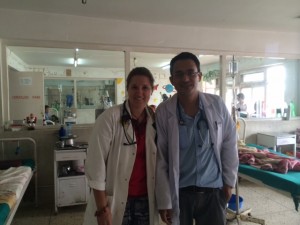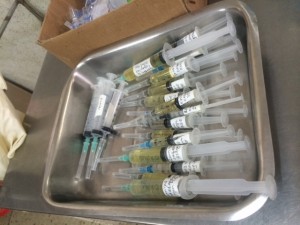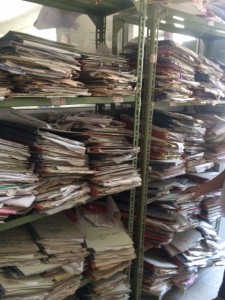There have been many firsts for me on this trip. One noticeable first was that I wasn’t in New Zealand for ANZAC Day this year. Usually I would be up out of bed in the dark, wrapped up in my puffer jacket at the chilly Dawn Service in Dunedin or Christchurch. This year found me at the Australian Embassy here in Kathmandu wearing short sleeves, a skirt and sandals in the blazing sun. There was a great turn out for the commemoration although I was one of only a handful of kiwis.
There was a lovely service with speeches from the Australian Ambassador, New Zealand Consulate and two representatives for the Gurkha army followed by wreath laying and two Gurkha buglers performing The Last Post and Reveille as the New Zealand and Australian flags were raised. As those haunting notes of The Last Post rang out I found myself shedding a tear not only for the New Zealand and Australian troops but for all the world’s soldiers who lay down their lives for the protection of their homes and families.
Also at the front of my mind were the many soldiers I met in the Falklands who have been permanently scarred, physically and emotionally, from various conflicts around the world. I know that the memory of some of those men and women will stay with me for the rest of my life, such as their impact on me was.
ANZAC Day is about reflection and remembrance. But we do not only remember the tragedies of the past but also the hard-fought victories and triumphs.
I have been attached to the oncology ward in Kanti Children’s Hospital over the last week or so and have seen a few defeats but also some very hard-fought victories there too. I have not seen a lot of paediatric oncology throughout my medical school years so it was yet again a week of firsts for me as well.
I think the first hard-fought victory to be mentioned must go to the tireless people behind the scenes. After decades of fundraising they have ensured that nearly all oncology treatment is free for the patients. Chemotherapy, surgery and radiation therapy are all very expensive and most Nepali families would not be able to afford such treatments, let alone the numerous other medications required, the medical equipment and hospital stays of up to several weeks at a time. However, thanks to the many people from all over the world who donate their money to this worthy cause thousands of Nepali children get the treatment they need free of charge.
Unfortunately the oncology ward still does not have enough bed-space. Everyday I have been there all the beds are full and there is often overflow into the medical wards. The oncology fund cannot cover these costs as well which means they must pay for their stay in the medical ward and the equipment they need. This is hugely frustrating for everyone when there are two floors in the hospital completely empty – awaiting enough funds to fill them with equipment and staff. There is no sign of that being accomplished in the foreseeable future. A frustrating defeat for sure.As I said above I have not had a lot of experience in paediatric oncology. On ward rounds and at outpatient clinic I saw a huge variation in cases. Brain tumors, sarcomas, Wilm’s tumors, Hodgkin’s and non-Hodgkins lymphomas, retinoblastomas, teratomas and many cases of leukaemia.
Acute lymphoblastic leukaemia (ALL) is by far the most common cancer on the ward. Each child has their own personalised calendar outlining their chemotherapy regimes in an easy to understand graphical format. Their therapy is individualised to them according to their risk level, stage of leukaemia and previous response to chemo. The most common reason for ALL patients to be admitted to the oncology ward is due to febrile neutropenia following chemotherapy.
This is one of the most serious complications of cancer treatment. The medications used wipe out not only the cancer cells but also the body’s normal immune cells. With no immune system even the most trivial infection can quickly escalate to overwhelming sepsis and death. As I mentioned in my last blog, infectious diseases are rife here in Nepal so it is no surprise that the oncology ward is often overflowing with these patients.
Another defeat I have witnessed several times is yet again to do with access to treatment. Granulocyte Colony Stimulating Factor (GCSF) is a drug that helps to build the immune system back up following chemotherapy and is recommended to all the ALL patients. Unfortunately as this drug is not essential the patients’ families must pay for it. It is very frustrating to see that most of the patients admitted are those who are unable to afford GCSF.
It is access to medications like these that we take for granted in NZ. People often get up in arms about PHARMAC not funding certain medications designed for various, usually rare, diseases. I know it is tough on those individual patients who may benefit, but we must try to remember how fortunate we are that as a population we are generally able to readily access the healthcare that we need when we need it with very minimal cost.Despite there being so many cases of febrile neutropenia on the wards there are very few resulting deaths. The oncology consultants really are wonderful people. They are so passionate about what they do and are some of the best patient advocates I have come across.
Unlike many other Nepali doctors I have come across, they take their time on ward rounds and go to great effort to educate the patients’ families. They talk to the patient and family as opposed to talking about them and involve them in every step of the treatment process. I think this empathy and understanding helps to achieve better clinical outcomes.
The families are involved in the treatment process so develop a good understanding of the disease and what is expected. They are educated about prevention of infections and also about what to look for in potential future episodes. This means they seek advice early which leads to prompt diagnosis and treatment; thus lower mortality rates. A definite victory on the medical battlefield.
One of the more memorable cases I have seen was a nine month old girl who was still in the throws of fighting her battle. She has stage IV bilateral Wilm’s tumor (a type of kidney tumor). One of her kidneys is completely non-functional and the other has around 20% function. She is currently undergoing chemotherapy to try to shrink the size of the tumor to allow the surgeons to operate. The aim will be to remove the tumor and preserve the still-functional segment of kidney.
If this is unsuccessful she will require a kidney transplant. I hate to think of the difficulties associated with a kidney transplant in someone so young here in Nepal. First the difficulty of finding a suitable donor (fingers crossed one of the parents is a match), then there is the expensive anti-rejection medications and the ever-present risk of infections and renal failure.
These sorts of cases are complicated enough to manage in first-world countries with super-specialised consultants that have access to the latest and greatest investigations and treatments. I don’t want to think about the prospects of this little girl’s future should the surgery fail. I fear it would almost certainly end in a tragic defeat.I have certainly had a roller-coaster ride of ups and downs during my oncology attachment. I guess that is to be expected in most fields in medicine but I think they are often higher ups and lower downs when you are dealing with cancer. Perhaps even more pronounced again when the patients are children. I am moving to a surgical team now for my last couple of weeks here. No doubt that will yet again highlight the differences between medical practice here and at home.
Oh and it rained the other day for the first time! We had a full 24 hours of torrential rain and continual thunder and lightening. It was really quite dramatic! The following day did reveal better views of the city but the surrounding hills were definitely still quite hazy, rather disappointing!! And instead of dealing with dust getting all over my clothes I instead had to avoid slipping over in the streets and getting mud all over them! My black shoes are now brown.




1 Comment to 'Blog 6: Victories and Defeats by Rebecca Craw'
January 12, 2015
Hi, i have heard of a doctor in Kanti Children Hospital called Dr. Bishop Joshi who should be able to help me… I have been told he could organize some medical visit to poor places like orphanages. I’ve been volunteering in one of them where children have a lot of little problems, and i would like some help from a doctor to institute a montly visit or something like this. But i can’t find his contact anywhere. By any chance, do you have it? Or any good contact in this hospital i could ask for this “service”?
You can answer me on my email.
Thank you very much.
Leave a comment